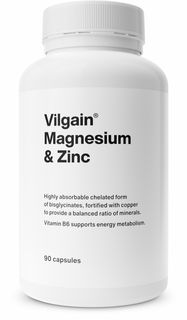





Effects of magnesium
Magnesium, or magnesium, is one of the most important elements found in the human body. It is needed in every cell, where it interferes with energy‑producing enzymatic reactions. However, it is also responsible for a variety of other functions and is involved in the optimal/correct functioning of the body. The main effects include:
- reduction of fatigue and exhaustion,
- proper functioning of the nervous and muscular systems,
- promoting psychological well‑being and reducing irritability,
- support of energy metabolism,
- improved oxygen utilization in the cells,
- reducing oxidative stress and delaying cellular aging, and
- prevention of cramps.
For women, magnesium can help during difficulties with so‑called premenstrual syndrome which is characterised by pain in the lower abdomen, back pain irritability or hypersensitivity.
But too much of anything is bad for you, and magnesium is no different, although an overdose is unlikely in normal situations. Side effects of magnesium include lack of appetite, diarrhea, bloating, vomiting, low blood pressure and slowing of the heart rate. In such cases, the simplest solution should be to temporarily discontinue magnesium.
How to recognize a magnesium deficiency?
One third of the population is affected by magnesium deficiency. Especially in the male population, the deficiency is caused by a different composition of the diet, which then needs to be enriched with a dietary supplement. The most common manifestations of magnesium deficiency include:
- muscle cramps and tingling of the limbs,
- fatigue, insomnia, headaches and impaired concentration,
- moodiness, susceptibility to stress and depression,
- nervousness, heart palpitations,
- nausea, diarrhea or
- impaired hair and nail quality.
Although you shouldn't ignore these signals, the easiest way to determine a magnesium deficiency in the body is through a blood count.
When to take magnesium
The primary source of magnesium should be a varied diet (whole grains, legumes, nuts, cocoa, or leafy greens), but in the event of a deficiency, it is advisable to take a dietary supplement. The recommended daily dose of magnesium for adult men is 350 mg, for women 300 mg. During pregnancy and breastfeeding, magnesium consumption increases, with recommended doses of 310 and 390 mg respectively. Its need also increases in athletes or in people with inflammatory bowel disease.
Forms of dietary supplements with magnesium
As with other substances, magnesium can be found in different forms, which differ in part in their availability and other properties. The most common ones are:
- oxides, chlorides, sulphates, carbonates or phosphates - inorganic forms which are unfortunately characterised by low absorption,
- malate, lactate - organic forms which have very good absorption and are gentle on digestion,
- magnesium citrate - has good absorption, but at higher doses there is an increased risk of laxative effects,
- magnesium chelates (recommended) - this form forms a "pincer" of 2 amino acids, e.g. glycine, which clamps the mineral. This creates a complex which is then very well absorbed. It is in the form of magnesium bisglycinate that you will find this mineral in Vilgain Magnesium.
Which magnesium to choose?
You can encounter magnesium in the form of classic tablets, capsules, powder or even convenient liquid magnesium - in shots for convenient use on the go. A less suitable alternative is water‑soluble effervescent tablets, where magnesium is overwhelmingly found in inorganic forms and its absorption is low. If you don't know which one, try magnesium brands Vilgain, Reflex Nutrition, Nutrend or Prom‑IN, which you won't go wrong with.



